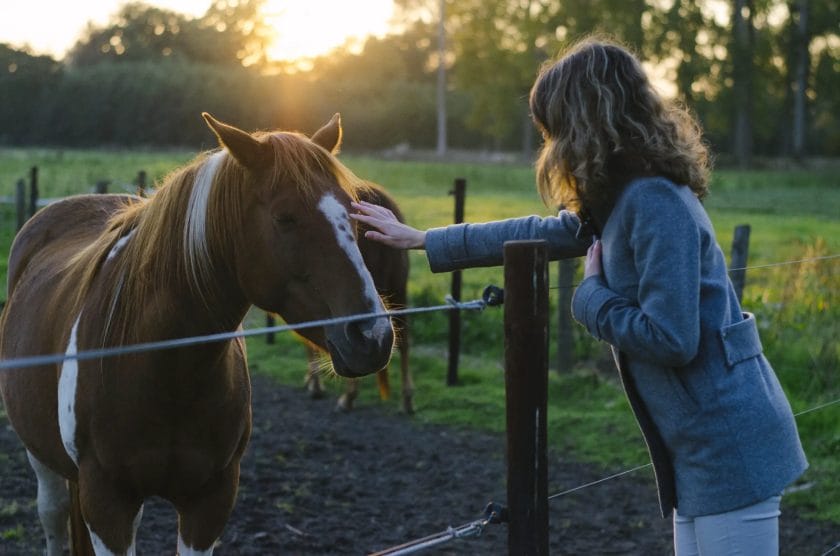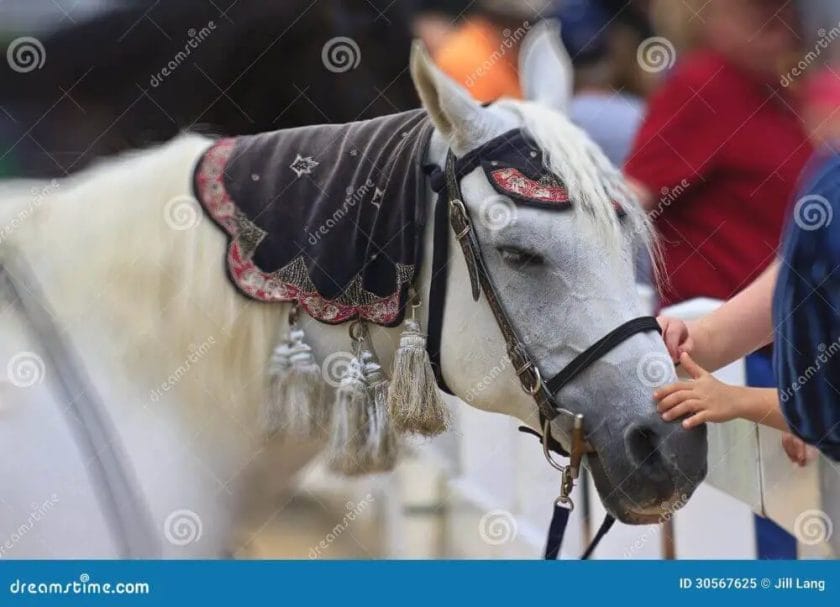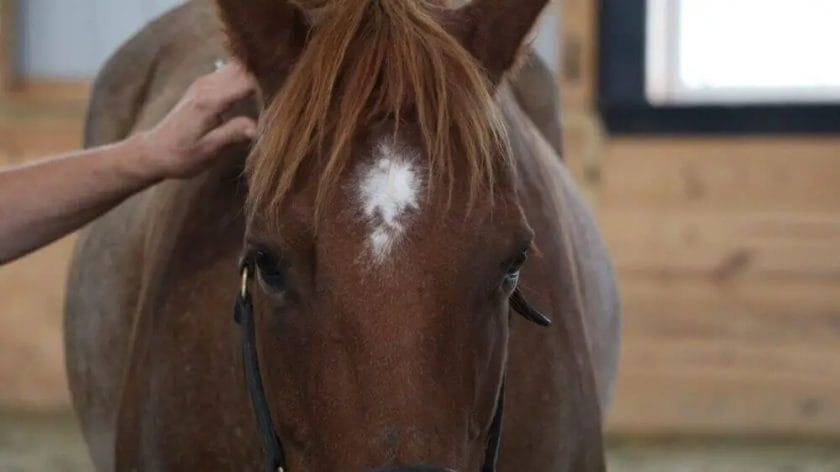Horses are highly social and intelligent animals that can form strong bonds with humans. While individual preferences may vary, many horses enjoy being petted and groomed as it provides them with comfort and relaxation. Petting a horse helps to strengthen the bond between the horse and the handler, fostering trust and affection. However, it’s important to approach and interact with horses safely and respectfully, following their cues and body language to ensure a positive experience for both the horse and the handler.

Best Practices for Petting Horses: Dos and Don’ts
When it comes to petting horses, there are certain best practices that every horse enthusiast should follow. By understanding these dos and don’ts, you can ensure a positive and safe interaction with these majestic animals. In this section, we will explore some essential guidelines for petting horses.
Do:
- Approach the horse calmly and slowly: Horses are sensitive creatures, and sudden movements can startle them. Approach the horse from the side or front in a calm and non-threatening manner.
- Allow the horse to smell and get to know you: Before attempting to pet the horse, extend your hand and allow them to sniff and become familiar with your scent. This helps to establish trust and rapport.
- Start with gentle strokes: Begin by softly stroking the horse’s neck or shoulder. Use long, slow motions and pay attention to the horse’s body language. If they seem comfortable, you can gradually move to other areas.
- Observe the horse’s reactions: Horses communicate through body language. Pay attention to their ears, eyes, and overall demeanor. If the horse appears tense, anxious, or agitated, it’s best to step back and reassess the situation.
- Respect the horse’s personal space: Just like humans, horses have different boundaries and comfort levels. Avoid crowding or invading their personal space. Give them room to move and retreat if they desire.
Don’t:
- Approach the horse from behind: Horses have a blind spot directly behind them, and sudden movements from this angle can startle them. Always approach from the side or front.
- Make sudden loud noises: Loud noises can startle and scare horses. Speak softly and avoid sudden bursts of noise or quick movements that may intimidate them.
- Pat or slap the horse: Horses are sensitive to touch, and a loud pat or slap can be unpleasant for them. Stick to gentle strokes and avoid slapping or patting them forcefully.
- Feed the horse without permission: While it may be tempting to offer treats to horses, it’s essential to ask for permission from the horse’s owner or handler. Some horses may have dietary restrictions or health issues.
- Approach unfamiliar horses without supervision: If you encounter a horse you are not familiar with, it’s best to seek guidance from a knowledgeable horse handler or owner. They can ensure your safety and the horse’s well-being.
Remember, horses are powerful and sensitive animals, and it’s crucial to approach them with respect and caution. By following these best practices for petting horses, you can create a positive and enjoyable experience for both you and the horse.

Signs of Affection in Horses: How They Show they Enjoy Being Petted
Have you ever wondered if horses enjoy being petted? It turns out that horses are quite expressive when it comes to showing affection and appreciation. As social animals, they have developed unique ways to communicate their feelings towards humans. In this section, we will explore the signs of affection in horses and how they demonstrate their enjoyment when being petted.
1. Relaxation and Softening of the Eyes
One of the most common signs that a horse is enjoying being petted is the relaxation and softening of their eyes. As you stroke their neck, back, or muzzle, you will notice their eyes becoming half-closed and gentle. This is an indication that they are experiencing pleasure and contentment.
2. Lowering of the Head
Another sign that a horse is enjoying being petted is when they lower their head. This action demonstrates trust and submission, as they are allowing you to touch and interact with their sensitive areas. By lowering their head, they are displaying a sense of relaxation and comfort in your presence.
3. Lip Quivering
When horses are extremely relaxed and content, you may notice their lips quivering as you pet them. This is known as the “flehmen response,” and it is a physiological reaction that indicates pleasure. The quivering of their lips is a sign that they are thoroughly enjoying the contact and stimulation.
4. Chewing and Licking
Horses often display signs of affection by chewing or licking when being petted. This behavior is similar to how a dog might lick your hand to show their appreciation. When horses chew or lick while being petted, it signifies that they find the interaction pleasurable and comforting.
5. Leaning or Leaning into the Contact
If a horse leans into you while you are petting them, it is a clear indication that they are enjoying the interaction. By leaning their body weight onto you, they are seeking more contact and expressing their desire for physical closeness. This behavior shows trust and a desire for further connection.
6. Nuzzling and Nibbling
Horses often show affection by nuzzling or nibbling at your clothing, hair, or hands. This gentle, playful behavior is their way of expressing their fondness for you. It is important to set boundaries and ensure that the nibbling remains gentle and does not escalate into biting.
7. Sighing or Exhaling
A relaxed and content horse may sigh or exhale while being petted. This is a sign of release and satisfaction, similar to how humans might sigh after receiving a comforting touch. It indicates that the horse is in a state of relaxation and enjoyment.
8. Ears Forward and Eyes on You
When a horse is genuinely enjoying being petted, they will often have their ears forward and their eyes focused on you. This signifies their attention and genuine interest in the interaction. Horses have highly perceptive senses, and their attentive posture shows that they are fully engaged and receptive to your touch.
In summary, horses have various ways of showing their enjoyment when being petted. From the softening of their eyes to the lowering of their head and the quivering of their lips, these signs indicate their relaxation, trust, and contentment. By understanding these signs of affection, we can deepen our bond with these magnificent animals and provide them with the love and care they deserve.

Bonding with Horses through Petting: Strengthening the Human-Horse Relationship
Building a strong bond between humans and horses is essential for effective horsemanship and a fulfilling equestrian experience. While there are various ways to establish this connection, one of the most powerful methods is through petting and physical interaction with these majestic creatures. In this section, we will explore the significance of bonding with horses through petting and how it can strengthen the human-horse relationship.
The Power of Touch
Human touch has been proven to have numerous benefits, both emotionally and physically. When it comes to horses, touch can be an incredibly potent tool for communication, trust-building, and mutual understanding. Petting a horse establishes a tactile connection, allowing both the human and the horse to feel and respond to each other.
When we pet a horse, we provide them with physical reassurance and comfort. Horses, like humans, have nerve endings under their skin that respond to touch. Gentle strokes can help relax a horse, reduce stress, and create a sense of well-being. Additionally, petting can release endorphins in both humans and horses, promoting a positive emotional state.
The act of petting also allows humans to become more attuned to a horse’s body language and subtle cues. Through touch, we can feel the horse’s muscle tension, body temperature, and overall condition, helping us understand their physical and emotional state. By actively engaging in petting, we deepen our ability to communicate and empathize with horses.
Establishing Trust and Respect
Petting a horse regularly helps establish trust and respect within the human-horse relationship. Horses are naturally cautious animals, and it takes time and consistent positive interactions to build their confidence in us as their human counterparts.
Through petting, we show horses that we can be gentle, respectful, and trustworthy. The act of touch becomes a language of reassurance and safety for them. By approaching the horse calmly and offering gentle strokes, we demonstrate that we respect their boundaries and can be trusted in their presence.
As the horse becomes more comfortable with petting, the trust between human and horse deepens. They begin to associate our touch with positive experiences and learn to rely on us for support and care. This trust becomes the foundation for further training, riding, and overall cooperation between the two.
Enhancing Emotional Connection
Petting not only strengthens the physical bond but also enhances the emotional connection between humans and horses. Horses are highly intuitive animals and can sense our emotions and intentions. Through petting, we have the opportunity to convey our affection, love, and positive energy to them.
When we pet a horse with kindness and compassion, they can feel the sincerity in our touch. This promotes a sense of security and contentment, allowing them to relax and let their guard down. As a result, the horse becomes more receptive to our guidance and leadership, making it easier to develop a harmonious partnership.
Bonding with horses through petting also provides a space for us to connect with our own emotions. The experience of being close to these gentle creatures can be therapeutic, reducing stress and anxiety. Petting a horse can have a calming effect on both the human and the horse, creating a serene environment for personal growth and emotional healing.
In summary, bonding with horses through petting is a transformative experience for both humans and horses. The power of touch allows us to communicate, establish trust, and deepen our emotional connection with these magnificent animals. Through consistent and respectful petting, we can build a strong foundation for a harmonious and fulfilling human-horse relationship.
The Benefits of Petting Horses: Health and Emotional Well-being for Both Humans and Horses
When it comes to owning and caring for pets, horses may not be the first animal that comes to mind. However, petting horses can have a multitude of benefits for both humans and horses alike. In this section, we will explore the various health and emotional advantages that come with interacting with these magnificent creatures.
1. Physical Health Benefits
Petting horses can have a positive impact on our physical well-being. Here are some of the ways in which interacting with horses can benefit our health:
- Stress Reduction: Petting horses has been proven to release endorphins, the feel-good hormones, which help reduce stress levels. The rhythmic motion of stroking a horse can have a calming effect on our nervous system.
- Lower Blood Pressure: Studies have shown that being around horses can help lower blood pressure. Petting and interacting with these gentle giants can have a calming effect on our cardiovascular system, reducing the risk of hypertension.
- Physical Exercise: Caring for horses requires physical activity, such as grooming, leading, and maintaining their living environment. These activities provide a moderate level of exercise, which can improve our overall fitness and cardiovascular health.
- Improved Balance and Coordination: Riding horses and engaging in horse-related activities can enhance our balance and coordination skills. The act of sitting on a horse and guiding its movements helps strengthen core muscles and improve posture.
2. Emotional Well-being
Besides the physical benefits, petting horses can also have a tremendous impact on our emotional well-being. Here are some ways in which interacting with horses can improve our emotional health:
- Connection and Bonding: Horses are highly social animals and have a natural ability to form emotional connections. Interacting with horses can provide us with a sense of connection and bonding, fostering feelings of companionship and empathy.
- Stress Relief: Spending time with horses can be a great way to escape the pressures of everyday life. The peaceful and tranquil environment of a stable or equestrian center can serve as a sanctuary, allowing us to unwind and find solace.
- Boosted Confidence: Working with horses requires a certain level of assertiveness and confidence. As we learn to handle and care for these powerful animals, our self-confidence grows, which can positively impact other areas of our lives.
- Therapeutic Effect: Petting horses has been linked to therapeutic effects, particularly for individuals with mental health issues or disabilities. Equine-assisted therapy programs have shown significant benefits in reducing symptoms of anxiety, depression, and post-traumatic stress disorder (PTSD).
3. Benefits for Horses
While petting horses offers numerous advantages for humans, it is also important to recognize the benefits it provides to the horses themselves:
- Human Interaction: Horses are social animals and enjoy human interaction. Regular petting and grooming sessions provide them with mental stimulation and a sense of companionship.
- Bonding and Trust: Consistent human touch helps build trust between horses and their caretakers, strengthening the bond between them. This bond is crucial in establishing a harmonious relationship and effective communication.
- Health Check-ups: Through petting and grooming, horse owners can identify any physical issues or abnormalities, such as injuries, skin conditions, or signs of illness. This allows for early detection and prompt veterinary care.
- Emotional Well-being: Just like humans, horses can experience emotional benefits from physical touch. Petting and grooming sessions help horses feel loved, cared for, and appreciated.
In summary, petting horses is not only a pleasurable activity but also offers various health and emotional benefits. From stress reduction and improved physical fitness to enhanced emotional well-being and bonding, interacting with horses can enrich our lives and the lives of these majestic creatures. Whether you are an avid equestrian or simply enjoy spending time with horses, the benefits are undeniable.
FAQs
Do horses like to be petted?
Yes, many horses enjoy being petted. It can help build trust and strengthen the bond between the horse and the human. However, it’s important to approach them calmly and gently, respecting their personal boundaries.
How often should I groom my horse?
Regular grooming is important for horses’ physical and mental well-being. Ideally, horses should be groomed daily to remove dirt, debris, and tangles from their coat. It also allows you to check for any injuries or abnormalities.
What should I feed my horse?
Horses require a balanced diet that includes good-quality hay or pasture, along with a specific amount of grain or concentrates (if needed) to meet their nutritional needs. It’s best to consult with a veterinarian or equine nutritionist to determine the most appropriate diet for your horse.
Conclusion:
In conclusion, it is safe to say that horses do enjoy being petted. Their response to being touched is often positive, as they have sensitive skin and enjoy the gentle stimulation. Petting a horse can help to build a bond of trust and create a sense of relaxation for the animal. However, it is important to approach and pet a horse in a calm and gentle manner, respecting their personal space and boundaries. Consistent and gentle interactions will help to establish a positive relationship between humans and horses, leading to a happier and more contented equine companion.

